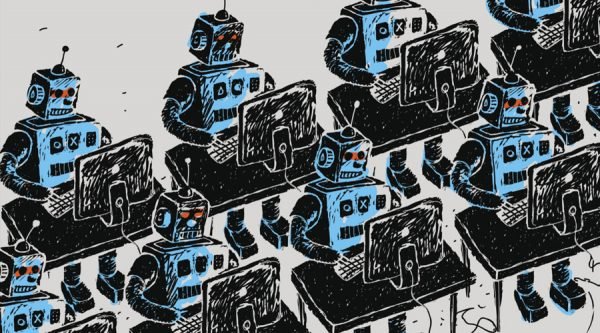Know everything about the tasks, roles, and jobs at risk.
While artificial intelligence (AI) has a significant positive influence on our society in many ways, there are significant worries about the future impact of A.I. on jobs and the workforce.
There are projections that millions of people would be unemployed in the coming decades, owing to the influence of Intelligent Automation and A.I. systems.
In any event, the whole socioeconomic system is undergoing a rapid transition, affecting markets, enterprises, education, government, social welfare, and job patterns. Let’s dive into more detail to understand how AI can impact the employment sector.
Tasks, Roles, and Jobs at Risk
Tasks that are repetitive can readily be automated, making some jobs obsolete over time. Customer service/call centre operations, document categorization, finding and retrieval, and material moderation, for example, are increasingly relying on technology and automation rather than human labour. Humans are being replaced in tasks linked to the production line and factory operation and supported by intelligent machines that can traverse space securely, discover and transfer things (such as goods, components, or tools), and conduct complicated assembly processes.
Even more complicated operations, such as those involving real-time processing of numerous signals, data streams, and accumulated knowledge, show that A.I. is extremely successful. Autonomous cars, for example, can collect and “understand” the world and its dynamics; they can “look,” “make a decision,” and “act” in real-time, all while pursuing well-defined optimization goals.
Jobs That AI Can Replace
Receptionists
Computerized phone and scheduling tools can replace a lot of the conventional receptionist position, especially at current technology firms that don’t have office-wide network infrastructure or international organisations, as Pam anticipated on The Office.
Couriers
Drones and robots are already replacing couriers and delivery personnel, so it’s only a matter of time before this industry is completely automated. At the same time, by 2024, this sector is anticipated to increase by 5%, so it may not happen as soon as you believe.
Advertising Salespeople
People just don’t need to manage sales for marketers that want to acquire ad space as advertising changes away from print and television and toward the online and social media environments. More social media networks are removing the salesperson and making it faster and simpler for users to generate money by providing free application programme interfaces (APIs) and self-serve ad markets, which is reflected in the industry’s predicted 3 per cent drop.
Retail Salespeople
If you’ve recently visited a mall, a dealership, or a clothing store, you may not have been served by a salesman at all. Companies are democratising the customer experience with services like self-checkout, and today’s customer is much more internet-savvy and more inclined to perform their own research and purchase.
Proofreaders
Proofreading software is widely available, and we use it frequently at HubSpot. Now there are several technologies out there that make it much easier to self-check your own work, from Microsoft Word’s basic spelling and grammatical check to Grammarly and the Hemingway Application.
Telemarketers
You’ve undoubtedly already received robocalls for various products and services, yet job growth in the telemarketing industry is predicted to drop by 3% by 2024. This is due in large part to the prerequisites for success: Telemarketers, unlike other sales positions, do not require a high level of mental or psychological intelligence to succeed. Direct telephone open rates are generally less than 10%, making this a prime candidate for automation.
Bookkeeping Clerks
By 2024, jobs in this field are predicted to drop by 8%, and it’s easy to see why: most bookkeeping is being automated if it hasn’t yet. It’s no wonder that this profession has such a high likelihood because software like QuickBooks, FreshBooks, and Microsoft Office already perform the bookkeeping for you at a far lower cost than a person’s pay.
Compensation and Benefits Managers
This is unexpected considering by 2024, job growth is expected to climb by 7%. However, just because there is a need does not mean you are immune to automation. A human and paper-based software can generate more barriers, time delays, and expenses as organisations increase in size, especially across global marketplaces. Automated benefits systems may save time and effort when it comes to giving benefits to big groups of people, and firms like Ultipro and Workday are already popular.
Computer Support Specialists
With so much information on the internet with directions, step-by-step tutorials, and hacks, it’s no wonder that firms will rely increasingly heavily on bots and automation to handle support inquiries from staff and consumers in the future.
Market Research Analysts
Market research experts play a critical part in the development of messages, content, and products, but autonomous AI and surveys are making it easier and easier to get this information. With a brief Slack command, GrowthBot, for example, may do market research on neighbouring firms and rivals.
Jobs That AI Can’t Replace
1. Public Relations Managers
2. Chief Executives
3. Event Planners
4. Human Resource Managers
5. Sales Managers
6. Marketing Managers
7. Writers
8. Software Developers
9. Editors
10. Graphic Designers
Conclusion
While AI will automate some of the more time-consuming jobs, it will not be able to completely replace human emotions and behaviours that consumers and audiences recognise. When a client has an issue, some customers still prefer to speak with a real customer care representative rather than a bot. A firm may also require a chief executive or managers with high emotional intelligence and perhaps other teamwork-oriented abilities on a regular basis.
In the same way, AI may not be able to quickly replace a creative position or service that needs workers to think outside the box or attempt something new. The greatest approach to ward against robots is to identify irreplaceable talents and qualities, zero in on them, and build on them whenever possible.
Source: analyticsinsight.net









